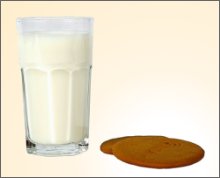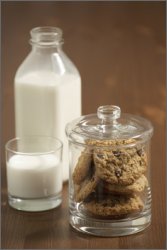Is Pasteurization More of a Health Risk or a Safety Benefit? Read This, Then YOU Tell Us What You Think
by www.SixWise.com
We're taught as early as elementary school about the French chemist Louis Pasteur and his famous invention: pasteurization. This is the process of heating food to kill bacteria, viruses, mold, yeasts and other potentially harmful organisms.
The first pasteurization test was performed back in 1862, after Pasteur noticed that microorganisms could contaminate beverages (he later extended this to the theory that microorganisms could contaminate humans and animals as well.). But pasteurization did not immediately become the gold standard for milk production in the United States.
|

"Pasteurized or raw?" has overtaken skim, whole or 2 percent as the great milk question.
|
In fact, at the end of the 19th century "swill dairies," in which cows were raised in horrible conditions and reportedly fed swill from liquor distilleries, were a major problem. The milk from these dairies was of such poor quality that it was thought to be contributing to the high death rate of urban infants at the time (the yearly death rate of U.S. infants in cities was about half of the yearly birth rate).
Thus, a crusade began for certified raw (unpasteurized) milk, which would ensure certain purity levels of milk and regular inspections of dairies.
"Though more and more milk was being pasteurized, pasteurization was seen by many as a stopgap measure that would no longer be needed once the production and distribution of milk was more carefully regulated. Certified milk was the model for the production of better milk everywhere," said Ron Schmid, ND, author of The Untold Story of Milk.
Yet by the early 20th century, milk supplies were still of poor quality, and thought to be involved in many disease outbreaks, leading authorities to push for mandatory pasteurization of all milk except certified raw milk.
"Not until the 1930s did commercial dairy interests, segments of the medical community, politicians and public health agency officials and their allies in the media begin a campaign first to smear all raw milk and then to eliminate its availability and sale," Schmid said.
Thus began the compulsory pasteurization of milk and the great debate that has spanned centuries: Is pasteurization one of the greatest discoveries, or greatest setbacks, of our time?
The Case for Pasteurization
"[Drinking raw milk is] like playing Russian roulette with your health," says John Sheehan, director of the Food and Drug Administration's (FDA) Division of Dairy and Egg Safety. "We see a number of cases of food-borne illness every year related to the consumption of raw milk."
According to the FDA, raw milk may contain any number of disease-causing organisms, including campylobacter, escherichia, listeria, salmonella, yersinia and brucella. Aside from causing acute diarrhea, stomach cramps, vomiting and fever, these organisms may also cause more serious conditions, particularly among the elderly, pregnant women, children or those with weakened immune systems.
The FDA says pasteurization helps prevent:
- Tuberculosis
- Diphtheria
- Polio
- Salmonellosis
- Strep throat
- Scarlet fever
- Typhoid fever
Milk can be contaminated from a sick or dirty animal, as well as by dirty living environments. "Think about how many times a cow lays down in a field or the barn," says Tom Szalkucki, assistant director of the Wisconsin Center for Dairy Research at the University of Wisconsin-Madison. "Even if the barn is cleaned thoroughly and regularly, it's not steamed. Contamination can take place because it's not a sterile environment."
Pasteurization, says the FDA, kills any dangerous bacteria while also destroying bacteria that can cause milk to spoil, thereby extending shelf life.
|

This simple food is surrounded by complex arguments.
|
One of the biggest controversies over pasteurized milk is whether or not the milk is able to retain its nutritional value after the high temperatures it is exposed to. Proponents of pasteurization say the process has little effect on the milk's nutritional value or flavor.
"Milk is a good source of the vitamins thiamine, folate, B-12, and riboflavin, and pasteurization results in losses of anywhere from zero to 10 percent for each of these, which most would consider only a marginal reduction," says Sheehan.
Further, "Pasteurization will destroy some enzymes," says Barbara Ingham, Ph.D., associate professor and extension food scientist at the University of Wisconsin-Madison. "But the enzymes that are naturally present in milk are bovine enzymes. Our bodies don't use animal enzymes to help metabolize calcium and other nutrients."
The Case for Raw Milk
On the other side of the fence are those who say pasteurization is unnecessary if cows are raised in clean environments, and radically changes the structure of the milk, resulting in an entirely different, and potentially harmful, food. According to the Weston A. Price Foundation:
"Pasteurization destroys enzymes, diminishes vitamin content, denatures fragile milk proteins, destroys vitamins C, B12 and B6, kills beneficial bacteria, promotes pathogens and is associated with allergies, increased tooth decay, colic in infants, growth problems in children, osteoporosis, arthritis, heart disease and cancer. Calves fed pasteurized milk do poorly and many die before maturity. Raw milk sours naturally but pasteurized milk turns putrid; processors must remove slime and pus from pasteurized milk by a process of centrifugal clarification."
Raw milk, proponents say, is an outstanding source of beneficial bacteria such as lactobacillus acidolphilus, vitamins, enzmes and calcium. Further, they say that sickness resulting from raw milk is rare--instead, it is pasteurized milk that is often implicated in outbreaks of food-borne illness.
According to Mark McAfee, founder of Organic Pastures Dairy, which produces a full line of raw organic dairy products for retail sale, "During the period 2000 through 2004 there were several listeria-related food recalls in California associated with pasteurized milk products and ice cream. During this same period more than 12 million servings of Organic Pastures products were consumed and not one person complained of illness and not one pathogen was ever found either by the state, FDA or Organic Pastures."
Organic Pastures then hired a laboratory to perform an experiment. The lab added 10 million counts of pathogens to one-milliliter samples of organic raw milk and found that the pathogens not only would not grow but they also died off. The lab concluded: " ... Organic raw milk and colostrum do not appear to support the growth of pathogens ... "
As it stands, the sale of raw milk across state lines is illegal. However, sales of raw milk, either in retail stores or directly from the farm, are legal within 28 U.S. states. In other states, raw milk may be available through cow "leasing" programs in which members purchase shares of a cow and can then use the milk how they choose.
 |
Please Let Us Know What YOU Think!
Select answers will be published in the forthcoming issue of the SixWise.com e-newsletter!*
*NOTE: Your answer, or an excerpt thereof, may be published in a forthcoming issue of the SixWise.com e-newsletter and on the website. By submitting your answer you authorize this. Please include your name and your city state (or country) location to be included in the publication of select answers! |
Recommended Reading
Soy Milk, Rice Milk or Almond Milk: Which is the Best Alternative Milk for You?
Should New Mothers Breastfeed or Be Encouraged to Give Infants Formula?
Sources
A Campaign for Real Milk
Pasteurize or Certify: Two Solutions to the "Milk Problem"
U.S. Food and Drug Administration: Got Milk? Make Sure It's Pasteurized